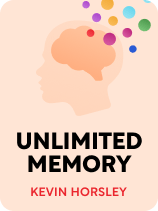

This article is an excerpt from the Shortform book guide to "Unlimited Memory" by Kevin Horsley. Shortform has the world's best summaries and analyses of books you should be reading.
Like this article? Sign up for a free trial here.
What is the importance of memory? What are the different types of memory?
Memory is crucial for human beings to function. Without memory, humans don’t have the ability to learn and retain new information that helps them build skills and grow as people.
Keep reading to learn more about memory’s role in learning.
Memory: The Foundation of Learning
What is the importance of memory? According to Unlimited Memory by Kevin Horsley, your memory is one of your most important abilities as a human being. It underpins learning—the process of gaining new knowledge—because remembering information is the key to utilizing it. Memory is also foundational to gaining skills because all skills build on knowledge. For example, in order to gain the skill of speaking another language, you have to build the knowledge of that language’s vocabulary, grammar, and pronunciation, and then you have to remember that knowledge so you can apply it.
| The Different Types of Memory Horsley writes about memory in a general sense, but there are different types of memory that store different types of information. His advice largely relates to semantic memory, or the memory of facts and information about the world. As we’ll see later, he often advises that you connect semantic memories to episodic memory—the memory of events and experiences—to help you better retain them. These are both types of declarative or explicit memory. His advice doesn’t apply as well to implicit memory, which includes things like procedural memory— the knowledge of how to perform tasks like sewing or playing an instrument. Implicit memory also includes priming, the phenomenon where a past experience increases how quickly you can respond to something in the present—for example, if you see a picture of a banana and then someone asks you to name a fruit, you’re more likely to respond with “banana” than another fruit like “apple” or “orange.” Implicit memory doesn’t require conscious effort to store or retrieve information, so conscious memory techniques may not directly improve your implicit memory. However, practicing these techniques may make your memory stronger overall, like exercising a muscle, so it could indirectly improve your implicit memory as well. |
Improving your memory will help you in many ways: For example, you’ll be able to connect better with others by remembering meaningful details about their experiences and identities. You’ll also be able to make better decisions in the moment because you won’t have to search for the information you need to base those decisions on—you’ll just have it waiting in your memory.
(Shortform note: A strong memory can have many advantages, but it can also come with some disadvantages: Remembering a great deal can cause you to feel overloaded with information or to have trouble distinguishing between important and unimportant information. It can also cause you to dwell on negative experiences in your past or hold on to unpleasant memories that you’d rather forget. In these cases, however, there are other memory techniques you can use to deliberately forget something, giving you even greater control over your memory and how you want to use it.)
Many people think of memory as a capacity you’re born with—they believe that some people simply have a better memory than others. However, Horsley asserts that this is a limiting belief: A self-fulfilling prophecy about your own limitations that keeps you from learning and tapping your mind’s full potential. In other words, if you believe you have a poor memory, this belief will hold you back and ensure that you do have a poor memory. The ability to remember information is a practice, not an innate trait, which means you can improve it through training and using memory techniques. Thus, you can incorporate a memory practice into your daily life to help you remember anything you want.
(Shortform note: There are other factors beyond practice that can impact your memory capacity. These include personal habits such as drug and alcohol use, sleep deprivation, health issues like vitamin deficiencies or poorly regulated epilepsy, brain injuries, and degenerative diseases like dementia. You may be able to improve your memory by avoiding alcohol, getting adequate rest, and maintaining a nutritious diet, but diseases and injuries are often beyond our control. Although memory loss is often accompanied by embarrassment and shame, avoid judging yourself if you suffer from a memory disorder that prevents you from making use of Horsley’s ideas.)
Horsley explains that you can use his techniques to achieve an unlimited memory. He uses this term literally: If you devote the necessary time and effort to it, there’s no limit to the amount of information you can remember.
(Shortform note: Research suggests that the human brain may have a limit to its memory capacity, but it’s so large you probably never need to worry about reaching it: Experts estimate the brain can hold up to 2.5 petabytes of information, which is equivalent to 2.5 million gigabytes. For comparison, the average laptop has about 256 gigabytes of storage capacity, which is just one 10,000th of the brain’s capacity.)
Horsley explains that having an unlimited memory is a matter of adopting four habits, which we’ve condensed into three: attention, association, and practice. In the next sections we’ll explore in more detail how to adopt each of these habits.

———End of Preview———
Like what you just read? Read the rest of the world's best book summary and analysis of Kevin Horsley's "Unlimited Memory" at Shortform.
Here's what you'll find in our full Unlimited Memory summary:
- Why there's no such thing as a bad memory
- How anyone can train their brain to learn and remember anything
- Memory association techniques and how to use them






